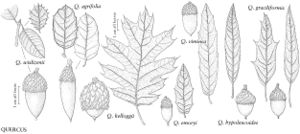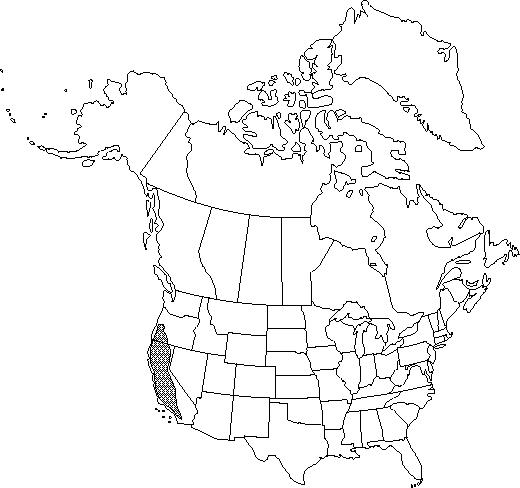Difference between revisions of "Quercus kelloggii"
Pacif. Railr. Rep. 6: 28, 89, fig. 6. 1859.
FNA>Volume Importer |
GeoffLevin (talk | contribs) m (Corrected "wislizenii" to "wislizeni" throughout.) |
||
| (7 intermediate revisions by 2 users not shown) | |||
| Line 13: | Line 13: | ||
}}{{Treatment/ID/Special_status | }}{{Treatment/ID/Special_status | ||
|code=F | |code=F | ||
| − | |label= | + | |label=Illustrated |
}} | }} | ||
|basionyms= | |basionyms= | ||
|synonyms={{Treatment/ID/Synonym | |synonyms={{Treatment/ID/Synonym | ||
| − | |name= | + | |name=Quercus californica |
|authority=(Torrey) Cooper | |authority=(Torrey) Cooper | ||
| − | }}{{Treatment/ID/Synonym | + | |rank=species |
| − | |name= | + | }} {{Treatment/ID/Synonym |
| + | |name=Quercus tinctoria var. californica | ||
|authority=Torrey | |authority=Torrey | ||
| + | |rank=variety | ||
}} | }} | ||
|hierarchy=Fagaceae;Quercus;Quercus sect. Lobatae;Quercus kelloggii | |hierarchy=Fagaceae;Quercus;Quercus sect. Lobatae;Quercus kelloggii | ||
| Line 37: | Line 39: | ||
|elevation=300-2400 m | |elevation=300-2400 m | ||
|distribution=Calif.;Oreg. | |distribution=Calif.;Oreg. | ||
| − | |discussion=<p>The abundant crops of acorns from Quercus kelloggii were at one time an important food source for Native Americans.</p><!-- | + | |discussion=<p>The abundant crops of acorns from <i>Quercus kelloggii</i> were at one time an important food source for Native Americans.</p><!-- |
| − | --><p>The species reportedly hybridizes with Quercus agrifolia (= Q. | + | --><p>The species reportedly hybridizes with <i>Quercus agrifolia</i> (= <i>Q.</i> ×<i>ganderi</i> C. B. Wolf) and <i>Q. wislizeni</i> (= <i>Q.</i> ×<i>morehus</i> Kellogg).</p> |
|tables= | |tables= | ||
|references= | |references= | ||
| Line 47: | Line 49: | ||
-->{{#Taxon: | -->{{#Taxon: | ||
name=Quercus kelloggii | name=Quercus kelloggii | ||
| − | |||
|authority=Newberry | |authority=Newberry | ||
|rank=species | |rank=species | ||
|parent rank=section | |parent rank=section | ||
| − | |synonyms= | + | |synonyms=Quercus californica;Quercus tinctoria var. californica |
|basionyms= | |basionyms= | ||
|family=Fagaceae | |family=Fagaceae | ||
| Line 61: | Line 62: | ||
|publication title=Pacif. Railr. Rep. | |publication title=Pacif. Railr. Rep. | ||
|publication year=1859 | |publication year=1859 | ||
| − | |special status=Endemic; | + | |special status=Endemic;Illustrated |
| − | |source xml=https:// | + | |source xml=https://bitbucket.org/aafc-mbb/fna-data-curation/src/2e0870ddd59836b60bcf96646a41e87ea5a5943a/coarse_grained_fna_xml/V3/V3_222.xml |
|genus=Quercus | |genus=Quercus | ||
|section=Quercus sect. Lobatae | |section=Quercus sect. Lobatae | ||
Latest revision as of 16:48, 30 November 2022
Trees, deciduous, to 25 m. Bark dark brown to black, ridges broad, irregular. Twigs brown to red-brown, (1.5-)2-3.5 mm diam., glabrate. Terminal buds chestnut brown, ovoid, 4-10 mm, glabrous or with scales ciliate on margins. Leaves: petiole 10-60 mm, glabrous to densely pubescent. Leaf blade ovate or broadly elliptic to obovate, 60-200 × 40-140 mm, base cordate to obtuse, occasionally rounded, margins with 7-11 lobes and 13-45 awns, lobes acute to distally expanded, separated by deep sinuses, apex acute; surfaces abaxially glabrous with small axillary tufts of tomentum to densely pubescent, adaxially glabrous to minutely pubescent, veins raised on both surfaces. Acorns biennial; cup saucer-shaped to deeply bowl-shaped, 13-27 mm high × 20-28 mm wide, covering 1/2-2/3 nut, outer surface glabrous to sparsely puberulent, inner surface 1/3 to completely pubescent, scales more than 4 mm long, attenuate or acuminate to acute, smooth, occasionally tuberculate near base of cup, tips loose, especially at margin of cup; nut oblong to broadly ellipsoid, 21-34 × 14-22 mm, puberulent, especially at apex, scar diam. 5.5-10.5 mm. 2n = 24.
Phenology: Flowering late spring.
Habitat: On slopes and valleys of hills and mountains
Elevation: 300-2400 m
Discussion
The abundant crops of acorns from Quercus kelloggii were at one time an important food source for Native Americans.
The species reportedly hybridizes with Quercus agrifolia (= Q. ×ganderi C. B. Wolf) and Q. wislizeni (= Q. ×morehus Kellogg).
Selected References
None.

